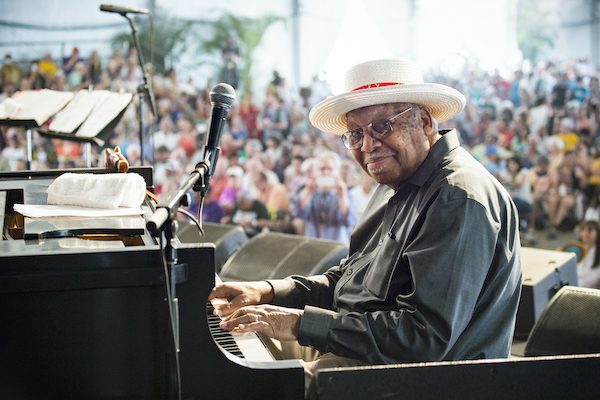Jan 13, 2026 2:09 PM
More Trump-Kennedy Center Cancellations
The fallout from the renaming of the John F. Kennedy Center for the Performing Arts to include President Donald…

Ellis Marsalis performs at the New Orleans Jazz & Heritage Festival on May 7, 2017.
(Photo: Erika Goldring)The following serves as a tribute to the musicians we have lost to the coronavirus pandemic. COVID-19 was a factor in the recent demise of each of the following artists.
Ellis Marsalis, the patriarch of a famous New Orleans family that has produced some of the top bandleaders and trendsetters in jazz, suffered COVID-19 symptoms and was awaiting test results when he died April 1. He was 85. Highly regarded as a pianist and educator, Marsalis was enshrined as an NEA Jazz Master along with his sons Wynton, Branford, Delfeayo and Jason in 2011.
In addition to playing on several of his sons’ albums, he also recorded many discs as a leader, including Ellis Marsalis Trio (1991), Whistle Stop (1994) and On The First Occasion (2013).
Marsalis was born in New Orleans in 1934. After earning a B.A. in music education from Dillard University in 1955, he played modern jazz with local colleagues until enlisting in the Marine Corps the following year. He soon became a member of the Corps Four, a Marines jazz quartet that performed on TV and radio to boost recruiting efforts.
In the 1970s, Marsalis studied music education at Loyola University, eventually earning a master’s degree. In 1974, he became the director of jazz studies at the New Orleans Center for Creative Arts high school, mentoring such artists as Reginald Veal, Terence Blanchard and Harry Connick Jr. After three years teaching at Virginia Commonwealth University in Richmond, he joined the faculty of the University of New Orleans, where he spent 12 years heading the jazz studies department. To celebrate his retirement in 2001, the entire Marsalis family performed together, as heard on the live recording The Marsalis Family: A Jazz Celebration.
Alto saxophonist Lee Konitz died April 15 in New York from complications caused by pneumonia and COVID-19. He was 92. An NEA Jazz Masters fellow and a member of the DownBeat Hall of Fame, the Chicago-born Konitz was revered for his work alongside Miles Davis on a series of 1949 and 1950 nonet recordings that eventually were compiled into the landmark 1957 album Birth Of The Cool.Konitz would go on to record dozens of albums during a career that spanned nine decades. Subconscious-Lee, an early leader date that featured pianist Lennie Tristano, exhibited a bebop influence, even as the saxophonist helped to define the “cool” sound that would rise to prominence on the West Coast.
In a 2017 interview with DownBeat, Konitz discussed a concept that he’s closely associated with: the contrafact, a musical work based on an earlier composition. “That’s a technique I just picked up along the way from whoever invented it, whether it was Bird or whoever,” he said. “I thought it was a legitimate addition to the vocabulary. I consider it equivalent in some way to adding homemade lyrics to a melody that you could deliver the standard changes on. But then you change them somehow.”
Bassist Henry Grimes passed away April 15 at age 84. His death was attributed to complications from COVID-19. The Juilliard-trained Grimes worked with Konitz, Thelonious Monk, Charles Mingus and Cecil Taylor, among others.
Grimes’ leader debut, The Call, was released in 1965, but after a prolific period in New York early in the decade, he relocated to Los Angeles in 1968. Finding little work, he dropped out of the music scene altogether. In 2002, a social worker tracked down Grimes, who didn’t own an instrument at the time. William Parker eventually gave him a bass, setting in motion one of the more intriguing comebacks in jazz history. Grimes went on to play hundreds of concerts, and appeared on Spirits Aloft, a 2010 duo project with drummer Rashied Ali, as well as guitarist Marc Ribot’s 2014 album, Live At The Village Vanguard.

Belá Fleck during an interview with Fredrika Whitfield on CNN.
Jan 13, 2026 2:09 PM
The fallout from the renaming of the John F. Kennedy Center for the Performing Arts to include President Donald…

Peplowski first came to prominence in legacy swing bands, including the final iteration of the Benny Goodman Orchestra, before beginning a solo career in the late 1980s.
Feb 3, 2026 12:10 AM
Ken Peplowski, a clarinetist and tenor saxophonist who straddled the worlds of traditional and modern jazz, died Feb. 2…

The success of Oregon’s first album, 1971’s Music Of Another Present Era, allowed Towner to establish a solo career.
Jan 19, 2026 5:02 PM
Ralph Towner, a guitarist and composer who blended multiple genres, including jazz — and throughout them all remained…

Rico’s Anti-Microbial Instrument Swab
Jan 19, 2026 2:48 PM
With this year’s NAMM Show right around the corner, we can look forward to plenty of new and innovative instruments…

Richie Beirach was particularly renowned for his approach to chromatic harmony, which he used to improvise reharmonizations of originals and standards.
Jan 27, 2026 11:19 AM
Richie Beirach, a pianist and composer who channeled a knowledge of modern classical music into his jazz practice,…